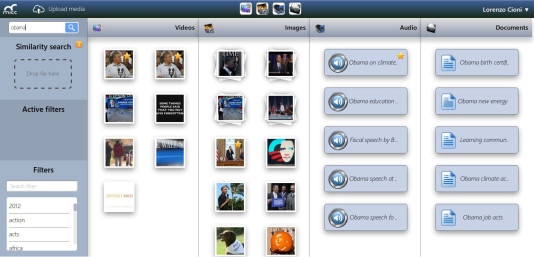Loki is a framework for the creation of web-based interfaces for search, annotation and presentation of multimedia data.
The framework provides tools to ingest, transcoder, present, annotate and index different types of media such as images, videos, audio files and textual documents. The fronted is compliant with the latest HTML5 standards, while the backend allows users to create processing pipelines that can be adapted for different tasks and purposes.

Cross-Media search session using Loki
Loki use the LIRE Solr Plugin to index images and keyframes, providing CBIR functionality to the framework.
The system has been developed aiming at creating loosely coupled components, letting developers to use it as a whole or to select only the parts that are needed to develop their own tools and systems.
The framework can be used by for different purposes and by different users, such as:
- Researchers who need an interface to to demo their own annotation systems, that can be added as processes in the backend;
- Researchers and practitioners who need to embed just some of the components in their own interfaces, e.g. to create demo or commercial web services;
- Researchers who need components to create ground truth annotations to create datasets or validate experiments, e.g. using web-based crowd-sourced services such as Amazon Mechanical Turk;
- Content managers or media producers who need to archive and retrieve one or more of the different types of media handled by the framework;
- Professors who need an educative tool for their courses related to multimedia.
Pingback: Loki+Lire: A Framework to Create Web-Based Multimedia Search Engines | MICC blog - Insights on research
Pingback: Open Source Paper with LIRE accepted at ACM MM 2014 | SemanticMetadata.net